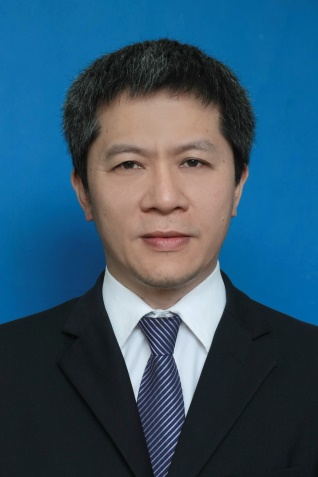
Prof. Haiquan Zhao, Southwest Jiaotong University
赵海全,教授,西南交通大学
Bio: Zhao Haiquan, PhD in Engineering, Professor, Senior Member of IEEE and the Chinese Institute of Electronics, Elsevier Highly Cited Scholar, Global Top 0.05% Scholar (ScholarGPS), Global Top 2% Scientist (Stanford), Academic and Technical Leader of Sichuan Province, Outstanding Expert with Outstanding Contributions in Sichuan Province, Winner of the Sichuan Province Outstanding Youth Fund, Distinguished Expert of the Haizhi Program of the Sichuan Association for Science and Technology, has published 280 SCI papers, received the First Prize of Natural Science from the Chinese Society of Automation, and six provincial and ministerial awards including the Second Prize for Science and Technology Progress from the Ministry of Education, the China Railway Science and Technology Progress Award, and the Tang Lixin Outstanding Scholar Award. He serves on the editorial boards of several international SCI journals including IEEE TASLP, IEEE TSMCA, IEEE SPL, and Signal Processing, among others. His main research areas are signal processing, pattern recognition, and artificial intelligence.
Title: Model, algorithm and application of broad learning system
Abstract: Deep neural networks have been widely used, but their complex network architecture also brings some challenges. In response to this, in 2017, researchers a shallow neural network model called the broad learning system, which can solve many problems in deep learning and has been applied in many fields. This report mainly discusses our team's research in broad learning systems and their applications in power systems.

Prof. Jianquan Ouyang, Xiangtan University
欧阳建权教授,湘潭大学
Bio:Ouyang Jianquan, Ph.D., Second-level professor of Hunan Province, doctoral supervisor, visiting scholar at the University of Georgia, U.S.A. He was selected as the third-level candidate of Hunan Province New Century 121 Talent Project in 2011. He was selected as the 2019-2020 Hunan Province "Three Districts" Talent Support Program. He was awarded the China Industry-University-Research Cooperation Promotion Award in 2019. He was awarded the Baosteel Education Award and the first outstanding science and technology worker in Xiangtan City in 2018. He was awarded the third prize of Hunan Province Natural Science in 2010. He was awarded the second prize of Hunan Province Teaching Achievement in 2013 and the second prize in 2016 and 2019. In 2014, he won the third prize of excellent achievements in educational scientific research in Hunan Province. In 2018, he won the national prize of teaching innovation in artificial intelligence and big data education in colleges and universities. In 2020, 2021,2022 and 2023, he won the "Outstanding Contribution Award" for Artificial Intelligence Big Data Blockchain Education in National Universities. In 2007, he was selected as the training object of young backbone teachers in general colleges and universities in Hunan Province. He is a senior member of China Computer Federation (CCF) and a liaison of Xiangtan University, a correspondent member of CCF Youth Working Committee, a member of CCF Education Working Committee, a correspondent member of CCF Big Data Expert Committee, a standing member of CCF Computer Application Professional Committee, a member of CCF Computer Vision Professional Committee, a member of CCF Pervasive Computing Professional Committee, a member of YOCSEF ( Young Computer Science and Technology Forum of Chinese Computer Society) Changsha Sub-Forum 2015-2016 Chair, Executive Member of CCF Changsha Member Center, Senior Member of Chinese Society of Artificial Intelligence.

Prof. Ammar Hawbani, Shenyang Aerospace University, Syria
安曼德,教授,沈阳航空航天大学
Bio: Ammar Hawbani, Professor. Received his Bachelor's, Master's, and Doctoral degrees in Computer Science and Technology from the University of Science and Technology of China in 2009, 2012, and 2015, respectively. Conducted postdoctoral research at the Department of Computer Science and Technology, University of Science and Technology of China from 2016 to 2019. April 2019–November 2023: Distinguished Researcher, School of Computer Science and Technology, University of Science and Technology of China. Primary research focuses on wireless vehicle networks, wireless sensor networks, wireless body area networks, mobile computing, and underwater sensor networks. Published over 120 SCI-indexed papers in top-tier international journals and conferences with significant global influence.
Title: A Hierarchical Architecture for Scalable and Trustworthy Autonomous Driving
Abstract: The pursuit of autonomous driving is defined by a central architectural dilemma. This talk begins by examining the two dominant paradigms: the traditional modular stack and the monolithic end-to-end model. We will analyze their respective operations, highlighting the critical trade-off they present: the modular system's verifiable safety versus its brittle performance, and the monolithic model's adaptability versus its untrustworthy 'black box' nature.
To resolve this impasse, we introduce the Hierarchical Policy Network (HPN), a novel hybrid architecture. HPN deconstructs the monolithic driving task into a library of specialized, end-to-end 'expert policies,' each mastering a specific behavioral primitive like lane changing or intersection handling. These experts are orchestrated by a high-level, strategic Arbiter.
Crucially, HPN addresses the limitations of its predecessors. It tackles the long-tail problem and corner cases by enabling focused training of specialist policies on rare-event data, ensuring robust performance where monolithic models fail. Furthermore, it solves the black box problem by integrating a deterministic 'Policy Gateway & Verifier,' which provides a provable safety guarantee over the learned components. This talk will demonstrate that HPN offers a pragmatic path toward creating autonomous systems that are simultaneously scalable, high-performing, and fundamentally trustworthy.

Prof. Ying Bi, Zhengzhou University, China
毕莹,教授,郑州大学
Bio: Ying Bi, Professor at Zhengzhou University, is a recipient of the National Young Talent Program, a Class C High-Level Talent of Henan Province, and a Senior Member of IEEE. Her primary research focuses on evolutionary computation, machine learning, and computer vision. She has led three national-level projects. She has authored one English monograph as the first author and published over 90 SCI/EI-indexed papers in leading international journals and conferences. She was awarded the IEEE Computational Intelligence Society (CIS) Outstanding PhD Dissertation Award. She services as associated editors for eight journals, including IEEE TEVC, IEEE TAI, IEEE TASE, ASOC. She is the chair of IEEE CIS Women in Computational Intelligence Committee, and the Chair of the IEEE CIS Task Force on Evolutionary Computer Vision and Image Processing. She is the program chair for IVCNZ 2025, panel chair for CEC 2026, LBA chair for GECCO 2026, etc.
Title: Genetic Programming: An Interpretable Approach to Image Classification
Abstract: Genetic Programming (GP), a branch of evolutionary computation, offers a unique paradigm for automated model generation by evolving interpretable mathematical expressions, decision trees, or program code. Unlike conventional "black-box" machine learning methods, GP produces human-readable models, enhancing transparency in AI-driven decision-making. This talk will explore GP's potential in image classification, discussing its current advances and the future research directions.
